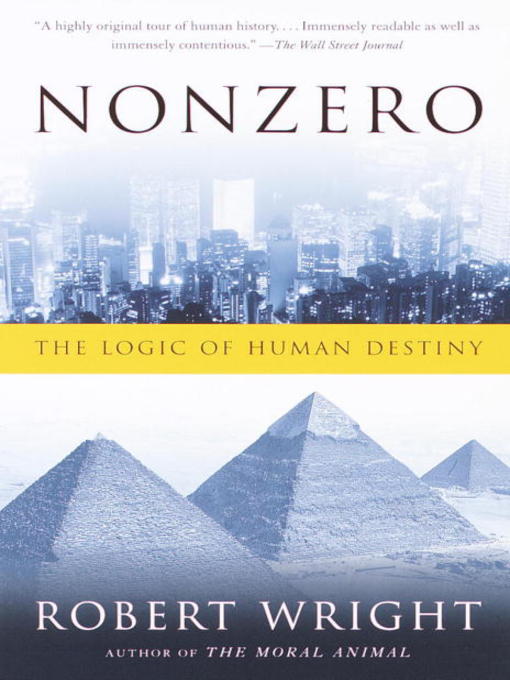
Nonzero
The Logic of Human Destiny
کتاب های مرتبط
- اطلاعات
- نقد و بررسی
- دیدگاه کاربران
نقد و بررسی

January 3, 2000
Evolution meets game theory in this upbeat follow-up to Wright's much-praised The Moral Animal. Arguing against intellectual heavyweights such as Isaiah Berlin, Karl Popper and Franz Boas, Wright contends optimistically that history progresses in a predictable direction and points toward a certain end: a world of increasing human cooperation where greed and hatred have outlived their usefulness. This thesis is elaborated by way of something Wright calls "non-zero-sumness," which in game theory means a kind of win-win situation. The non-zero-sum dynamic, Wright says, is the driving force that has shaped history from the very beginnings of life, giving rise to increasing social complexity, technological innovation and, eventually, the Internet. From Polynesian chiefdoms and North America's Shoshone culture to the depths of the Mongol Empire, Wright plunders world history for evidence to show that the so-called Information Age is simply part of a long-term trend. Globalization, he points out, has been around since Assyrian traders opened for business in the second millennium B.C. Even the newfangled phenomenon of "narrowcasting" was anticipated, he claims, when the costs of print publishing dropped in the 15th century and spawned a flurry of niche-oriented publications. Occasionally, Wright's use of modish terminology can seem glib: feudal societies benefited from a "fractal" structure of nested polities, world culture has always been "fault-tolerant" and today's societies are like a "giant multicultural brain." Despite the game-theory jargon, however, this book sends an important message that, as human beings make moral progress, history, in its broadest outlines, is getting better all the time.

October 15, 1999
Ranging grandly from hunter-gatherer societies to Chinese technology to Karl Popper, Wright uses game theory to show that life is not aimless.
Copyright 1999 Library Journal, LLC Used with permission.

January 1, 2000
A populistic presentation of the proposition, challenged by much evidence in history, that humanity is on an ineluctable path to betterment, material if not moral. Wright sees this having occurred over the range of human polities, from the hunter-gatherer band to the chiefdom to the nation-state. Writing in a conversational, offbeat manner, Wright maintains that societies evolve through combinations of technological innovation and plain old innate human competitiveness and status-seeking. "Add Technology and Bake for Ten Millennia" runs one typically chatty chapter title that ambles about the invention of agriculture even as it twits Margaret Meadean anthropologists who argue that societies have no evolutionary direction. Defining the process as "non-zero-sumness," the opposite of a zero-sum game, Wright supports his view by drawing on an impressive breadth of knowledge that happily doesn't lord over the text but rather buoys it with interesting connections. Ending with a push of his thesis of progressiveness into biology, of all things, Wright caps a spritely, opinionated big-picture history of human civilization. ((Reviewed January 1 & 15, 2000))(Reprinted with permission of Booklist, copyright 2000, American Library Association.)

























دیدگاه کاربران